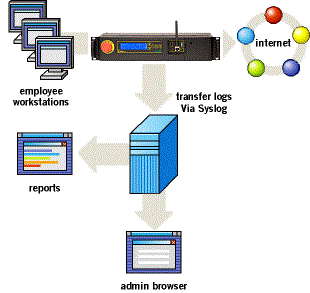Syslog

Syslog is a standard for logging
event data. A syslog network is composed of at least two machines -
the system(s) that transmit event messages (ie. power controllers), and the server
that logs events, reports, and analyzes the data. Most syslog servers support
email notification.
DLI power controllers support
the syslog protocall to track and log events such as logins, outlet switching, power consumption,
etc. To activate syslog on a DLI
power controller, simply add the IP address of the syslog server on the
SETUP page. Any number of power controllers may report to a single
syslog server.
Syslog can be used in combination with scripting.
For example, you may want to periodically report power consumption or outlet
status. By writing a simple script,
you can send periodic reports via syslog. Major events like logins, logouts, and changes to
settings and power switching will be sent automatically. Enter the
target IP of your syslog server on the setup page of the power controller. By
writing a simple script, you can expand reporting capability to send almost
anything via syslog.
Separate to syslog, all DLI power controllers have a local event log. Note
that the local log is volatile and circular, with old messages being replaced by
newer ones; messages aren't persisted across reboots. For persistent
non-volatile storage, configure the switch to forward the log to a syslog
server. DLI Power Controllers use the standard UDP port 514 to communicate via
syslog. To disable reporting, set the syslog IP to 0.0.0.0.
In WiFi equipped power controllers, you can limit the severity of the locally recorded log messages by setting a
minimal severity. All messages, regardless of severity, are sent; the receiver
is expected to do the filtering.
To change the UDP port in these
controllers, you may SSH in and use:
uci set
system.@system[0].log_port='514'
uci commit
reboot
Here's a popular free syslog server
for Windows. Here's a
step-by-step sylog installation under debian Linux. Here are some
tips for MacOS. In BSD, we use syslogd and logcheck. Alternatives to SYSLOG include internal event notification system and rolling your own using the RestAPI.
Thanks to our customer John Hasemeir for directions to these syslog utilities:
- Free Kiwi Syslog, a nice tool and good match for the power controllers.
- Splunk, a popular tool with a nice UI. Free demo version.